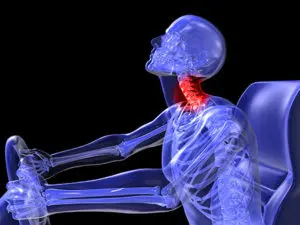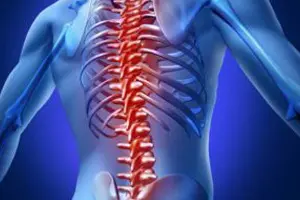There are plenty of injuries that can occur in automotive accidents. On top of that, symptoms from automotive injuries often don’t surface for weeks, months, or years after the incident.
The earlier you see a medical professional, the sooner they can address serious issues to ward off unforeseen complications that could affect your physical and mental wellbeing down the line.
Here we’ll be discussing some of the most common auto accident injuries that occur every year, and how the doctors at Complete Care can help.
 This is one of the most common neck injuries. It results from the sudden jolting of the neck, which is likely to occur even in a mild car accident, even if you’re wearing a seatbelt. Whiplash usually results from a rear-end collision.
This is one of the most common neck injuries. It results from the sudden jolting of the neck, which is likely to occur even in a mild car accident, even if you’re wearing a seatbelt. Whiplash usually results from a rear-end collision.
Like many auto accident injuries, the symptoms of whiplash can be latent – sometimes not fully developing until at least 24 hours following the accident. Symptoms include:
Some people who undergo whiplash experience symptoms for only a matter of days or weeks, while others can experience chronic pain as a result of moderate or severe whiplash. There are a number of ways auto accident injury doctors can help.
At Complete Care, we start by locating the source of your pain through a combination of physical and neurological examinations.
During the physical exam, we’ll evaluate your posture, range of motion, and overall physical condition, paying close attention to movements that increase your pain. We check for muscle spasms, misalignments in the spine, and evaluate your spine curvature. During the neurological exam, we’ll test your reflexes and muscle strength.
When it comes to whiplash, neck adjustments often yield the best results. Also known as cervical manipulation, a neck adjustment is usually performed by hand. With the right kind of adjustment, we can reduce soreness, stiffness, and inflammation, restoring your posture and range of motion. Many of our patients have expressed immediate relief following this treatment.

Often people describe full-body aches, while others describe more localized pain in specific muscles and joints. This usually results from inflammation, swelling, and tearing of various tissues. Musculoskeletal injuries can affect the overall nervous system, leading to referred pain in areas that may seem unrelated to the injured region. Fatigue is another common factor with these injuries, as well as sleeping difficulties.
As with our whiplash treatment, we start off with physical and neurological examinations to get a better idea of where your pain is coming from, and how best to solve it.
A chiropractic adjustment is often the best treatment for musculoskeletal pain, as it can reduce inflammation and swelling, restore joint function, and allow your body to move more freely with a greater range of motion. Chiropractic adjustments are usually hands-on procedures, but can also be accompanied by an instrument. They involve a wide variety of joints in the body, usually in the spinal cord.
Far too many people are using opioids for long-term treatment of chronic pain, and this is in part because far too many general practitioners are overprescribing them.

At Complete Care, our auto injury doctors offer treatment that doesn’t just mask the symptoms, it addresses the underlying cause. We understand that, like nature itself, the body is an interconnected system. An adjustment to one area of the body can have profound effects on another, seemingly unrelated part. We take a holistic approach rooted in a deep understanding of how car accidents affect the body. Give us a call today at (844) 699-2273 to get started.
The information provided on this website does not, and is not intended to, constitute legal advice; instead, all information, content, and materials available on this site are for general informational purposes only. Information on this website may not constitute the most up-to-date legal or other information. This website contains links to other third-party websites. Such links are only for the convenience of the reader, user or browser.